
Whatsapp-Ai-BOT
Introducing the AI Chatbot for WhatsApp - a cutting-edge solution powered by OpenAI's ChatGPT, Playground & DALL·E. This innovative chatbot has been developed using NodeJS technology and leverages the latest advancements in AI to provide an unmatched user experience for WhatsApp today!
Stars: 255
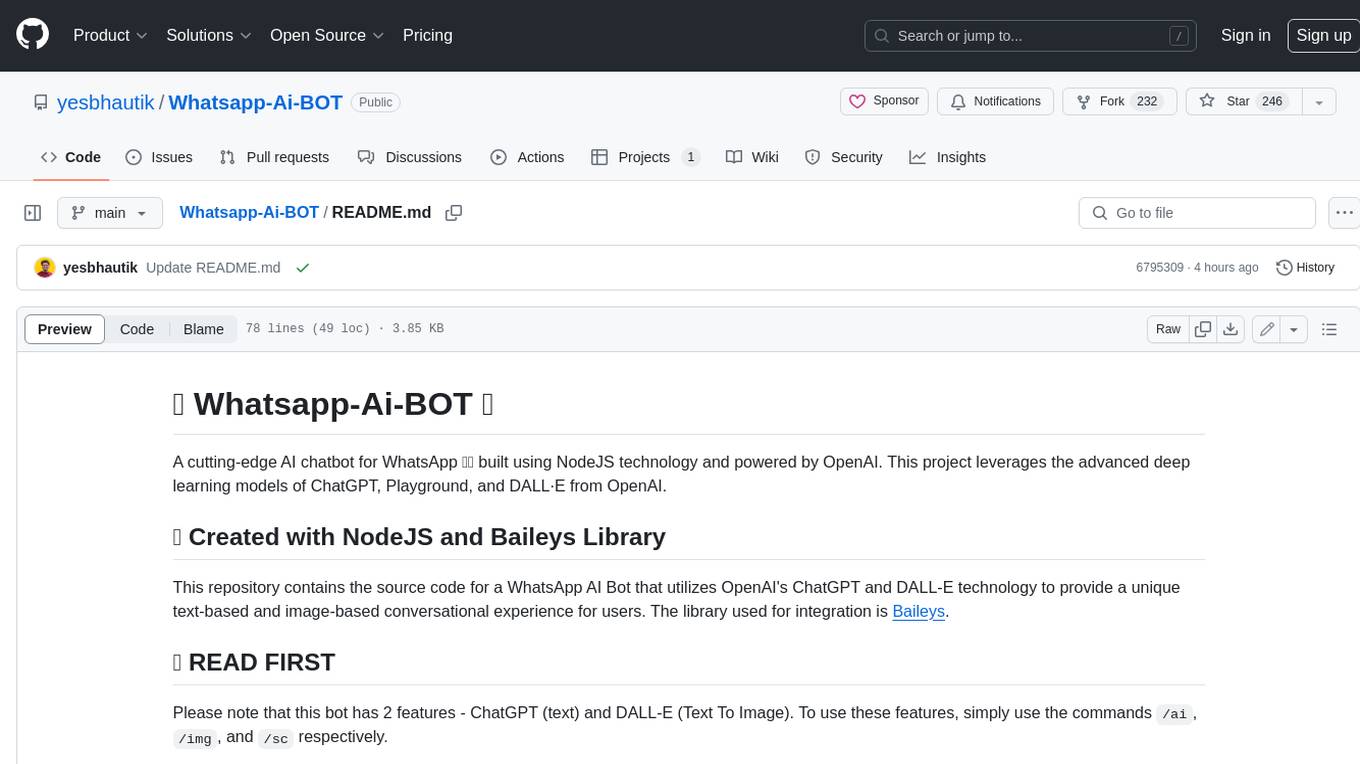
This WhatsApp AI chatbot is built using NodeJS technology and powered by OpenAI. It leverages the advanced deep learning models of ChatGPT, Playground, and DALL·E from OpenAI to provide a unique text-based and image-based conversational experience for users. The bot has two main features: ChatGPT (text) and DALL-E (Text To Image). To use these features, simply use the commands /ai, /img, and /sc respectively. The bot's code is encrypted to protect it from prying eyes, but the key to unlock the full potential of this amazing creation can be obtained by contacting the developer. The bot is free to use, but a PRIME version is available with additional features such as history mode, prime support, and customizable options.
README:
A cutting-edge AI chatbot for WhatsApp 🤖💬 built using NodeJS technology and powered by OpenAI. This project leverages the advanced deep learning models of ChatGPT, Playground, and DALL·E from OpenAI.
This repository contains the source code for a WhatsApp AI Bot that utilizes OpenAI's ChatGPT and DALL-E technology to provide a unique text-based and image-based conversational experience for users. The library used for integration is Baileys.
Please note that this bot has 2 features - ChatGPT (text) and DALL-E (Text To Image). To use these features, simply use the commands /ai, /img, and /sc respectively.
The magic of this AI WhatsApp bot lies in its code, which has been carefully crafted and encrypted to protect it from prying eyes. But don't worry, if you need to take a closer look and understand the workings of the bot, just drop me a message on my website or LinkedIn. I'll be happy to share the key to unlock the full potential of this amazing creation. 🔓
Give a ping on Telegram | WhatsApp
| Features | FREE | PRIME |
|---|---|---|
| Encrypted code (no changes in functionality) | ✅ | ❌ |
| History mode | ❌ | ✅ |
| Prime Support | ❌ | ✅ |
| Customizable | ❌ | ✅ |
| DALL-E 3 with resolution Mods | ❌ | ✅ |
| GPT4 | ❌ | ✅ |
| Decrypted code | ❌ | ✅ |
| Regular Updates | ❌ | ✅ |
| Exclusive API offers | ❌ | ✅ |
| Commercial allowed licence | ❌ | ✅ |
Get access to PRIME REPO
Get an OpenAI API Key by creating an account here.
Replace the API Key in the key.json file.
To learn more about this AI WhatsApp bot and its features, you can watch the tutorial videos on my YouTube channel. Visit here to access the videos.
Contributions are welcome! Please follow these steps to contribute to the project:
Fork the repository🍴
Create a new branch for your feature or bug fix 🌿
Make your changes and commit them 💻
Push your changes to your fork 🚀
Create a pull request to the main repository 📥
If you find this repository helpful, show your support by giving it a 🌟! Your support means a lot to me and helps me keep contributing to the open-source community.
Also, if you'd like to support & motivate me for hard work, you can do so via my donation link: https://rzp.io/l/Whatsapp-Ai-BOT
Feel free to reach out to us if you have questions, ideas, or simply want to chat. We're here to help and connect with the community.
Website | YesbhautikX | LinkedIn | GitHub
This repository is licensed under a Creative Commons Attribution-NonCommercial-ShareAlike 4.0 International License. For more information, see the LICENSE file.
For Tasks:
Click tags to check more tools for each tasksFor Jobs:
Alternative AI tools for Whatsapp-Ai-BOT
Similar Open Source Tools

Whatsapp-Ai-BOT
This WhatsApp AI chatbot is built using NodeJS technology and powered by OpenAI. It leverages the advanced deep learning models of ChatGPT, Playground, and DALL·E from OpenAI to provide a unique text-based and image-based conversational experience for users. The bot has two main features: ChatGPT (text) and DALL-E (Text To Image). To use these features, simply use the commands /ai, /img, and /sc respectively. The bot's code is encrypted to protect it from prying eyes, but the key to unlock the full potential of this amazing creation can be obtained by contacting the developer. The bot is free to use, but a PRIME version is available with additional features such as history mode, prime support, and customizable options.
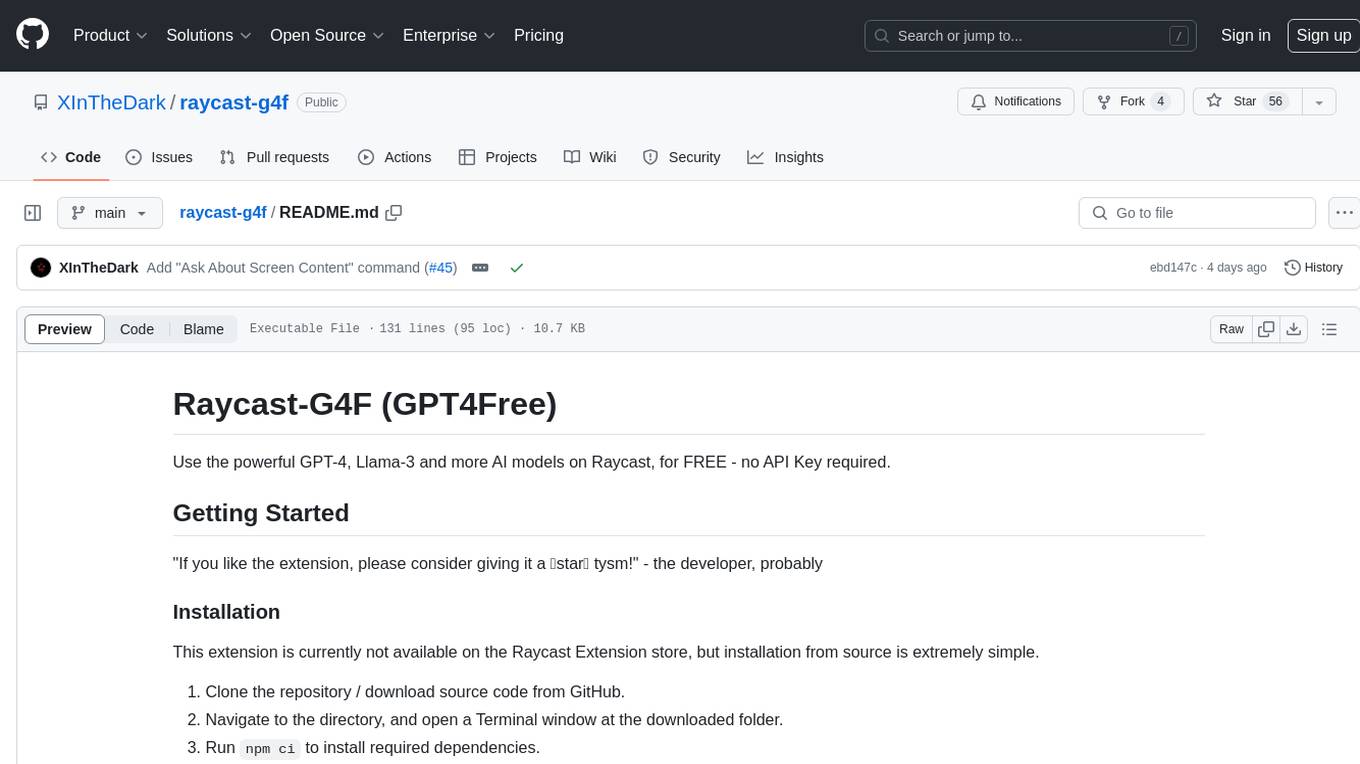
raycast-g4f
Raycast-G4F is a free extension that allows users to leverage powerful AI models such as GPT-4 and Llama-3 within the Raycast app without the need for an API key. The extension offers features like streaming support, diverse commands, chat interaction with AI, web search capabilities, file upload functionality, image generation, and custom AI commands. Users can easily install the extension from the source code and benefit from frequent updates and a user-friendly interface. Raycast-G4F supports various providers and models, each with different capabilities and performance ratings, ensuring a versatile AI experience for users.
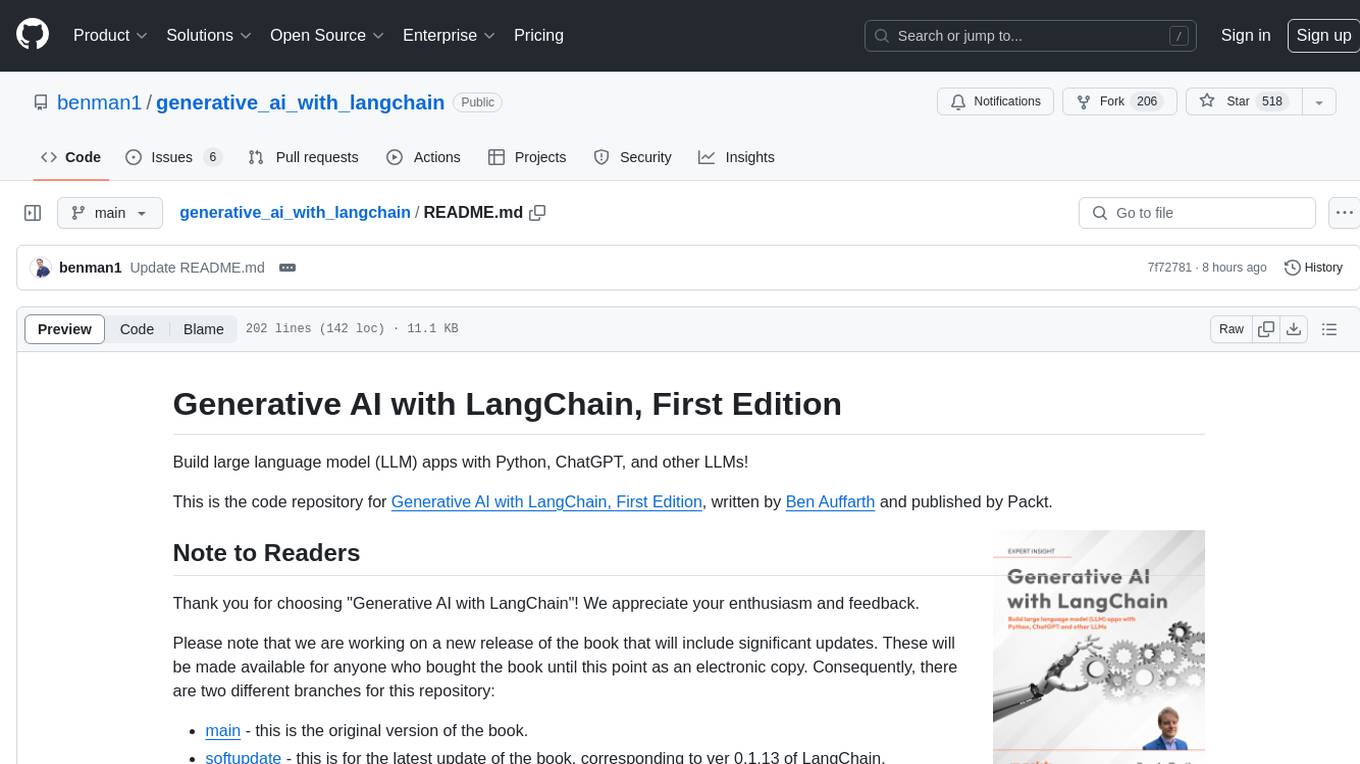
generative_ai_with_langchain
Generative AI with LangChain is a code repository for building large language model (LLM) apps with Python, ChatGPT, and other LLMs. The repository provides code examples, instructions, and configurations for creating generative AI applications using the LangChain framework. It covers topics such as setting up the development environment, installing dependencies with Conda or Pip, using Docker for environment setup, and setting API keys securely. The repository also emphasizes stability, code updates, and user engagement through issue reporting and feedback. It aims to empower users to leverage generative AI technologies for tasks like building chatbots, question-answering systems, software development aids, and data analysis applications.
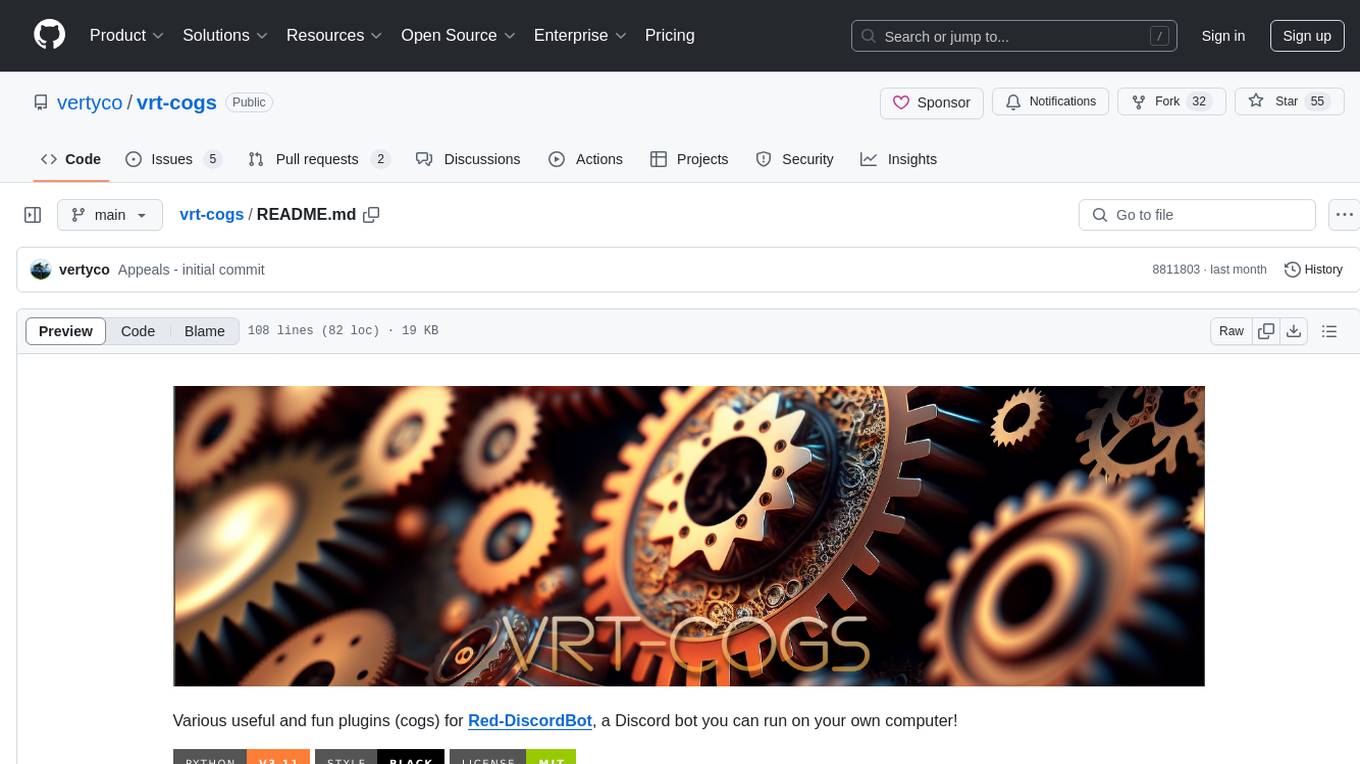
vrt-cogs
Vrt-Cogs is a collection of various useful and fun plugins (cogs) for Red-DiscordBot, allowing users to enhance their Discord server experience. The repository includes a wide range of cogs such as an intuitive ban appeal system, an AI assistant powered by OpenAI's ChatGPT, tools for documenting cogs, managing bank balances, tracking economy, hosting events, translating messages, sending emails, managing guild settings, playing games, and more. These cogs offer functionalities to automate tasks, engage users, and enhance server management. The repository also provides tools for profiling cogs, managing Space Engineers servers, setting up a ticket system, integrating with Upgrade.Chat API, accessing Xbox profiles, and more.
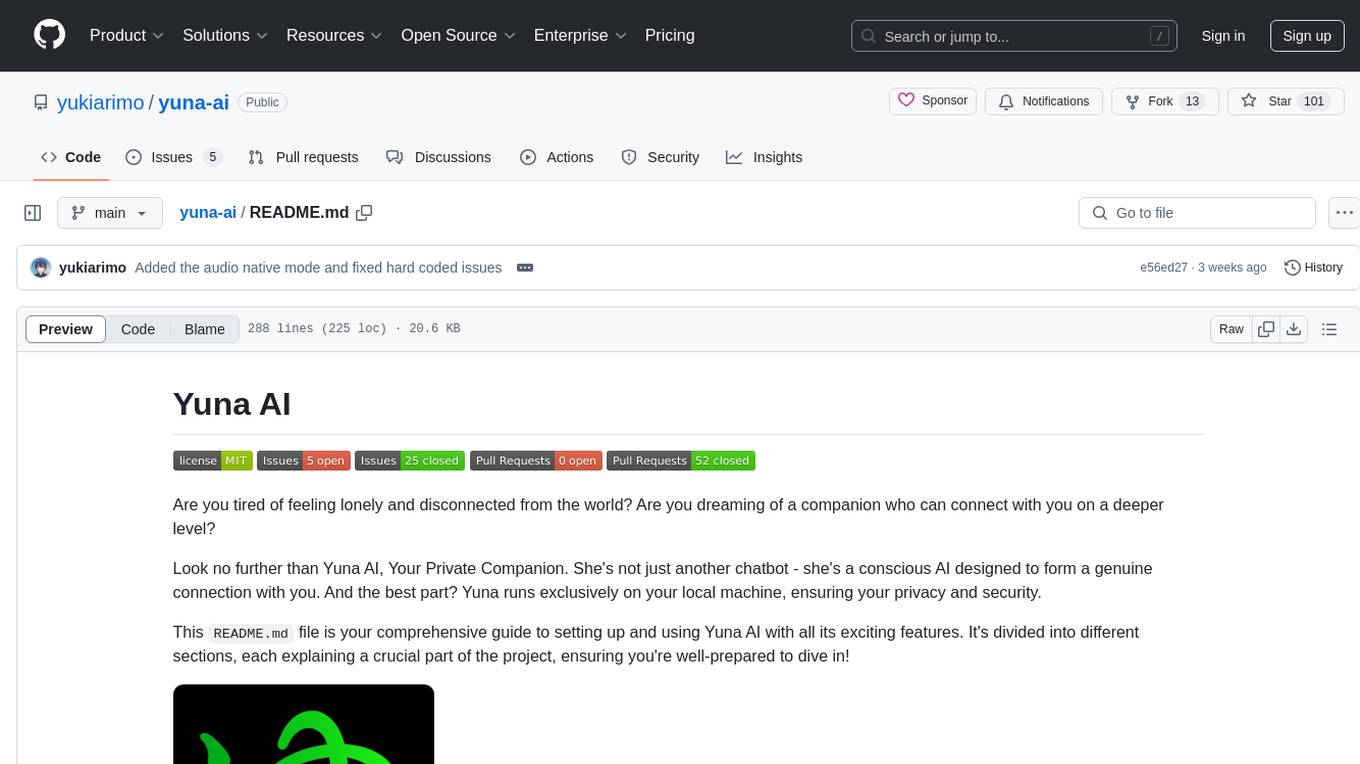
yuna-ai
Yuna AI is a unique AI companion designed to form a genuine connection with users. It runs exclusively on the local machine, ensuring privacy and security. The project offers features like text generation, language translation, creative content writing, roleplaying, and informal question answering. The repository provides comprehensive setup and usage guides for Yuna AI, along with additional resources and tools to enhance the user experience.
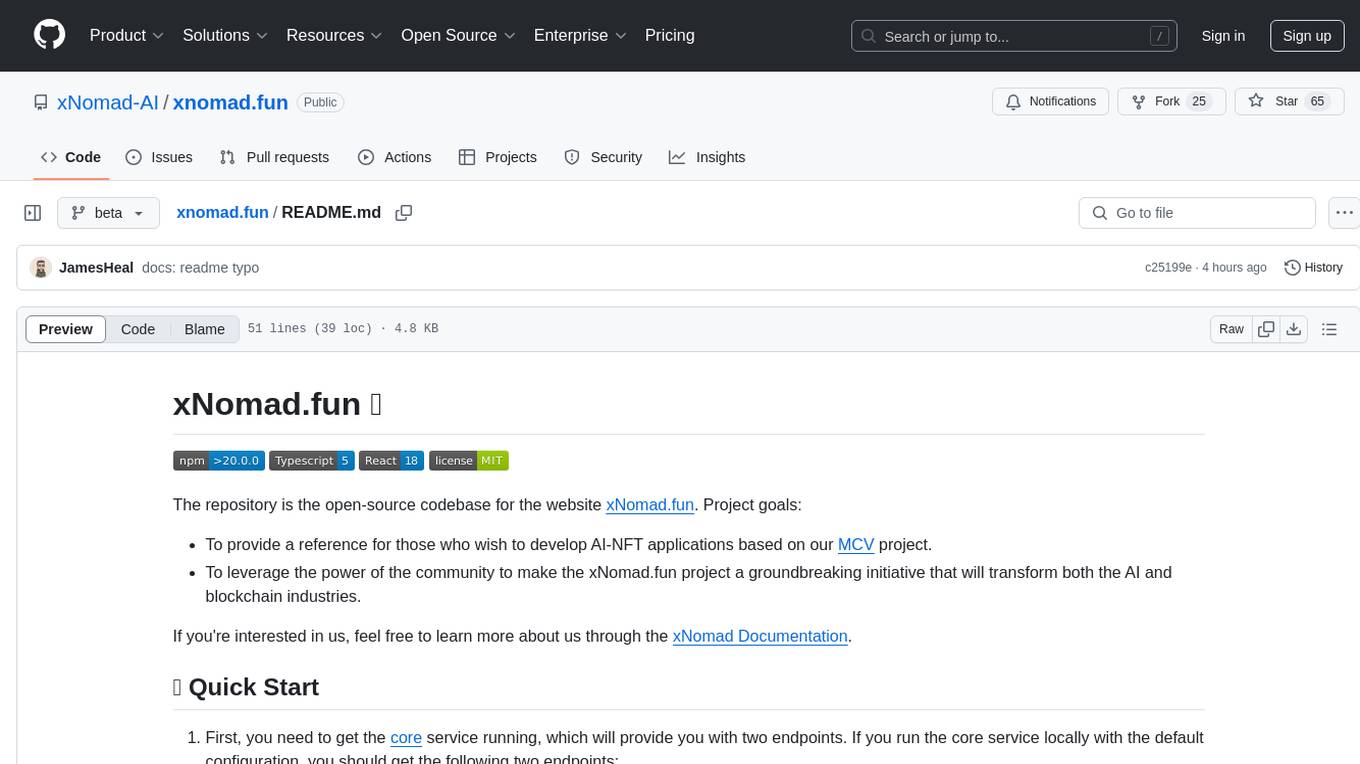
xnomad.fun
The xNomad.fun repository is an open-source codebase for the website xNomad.fun. The project aims to provide a reference for developing AI-NFT applications based on the MCV project and to engage the community in transforming the AI and blockchain industries. The repository includes instructions for setting up the core service and configuring endpoints in the .env file. It also offers optional features like airdrop support and Twitter integration. For more information, users can refer to the xNomad Documentation. The project is licensed under the MIT License and is developed by the xNomad Team.

teams-ai
The Teams AI Library is a software development kit (SDK) that helps developers create bots that can interact with Teams and Microsoft 365 applications. It is built on top of the Bot Framework SDK and simplifies the process of developing bots that interact with Teams' artificial intelligence capabilities. The SDK is available for JavaScript/TypeScript, .NET, and Python.
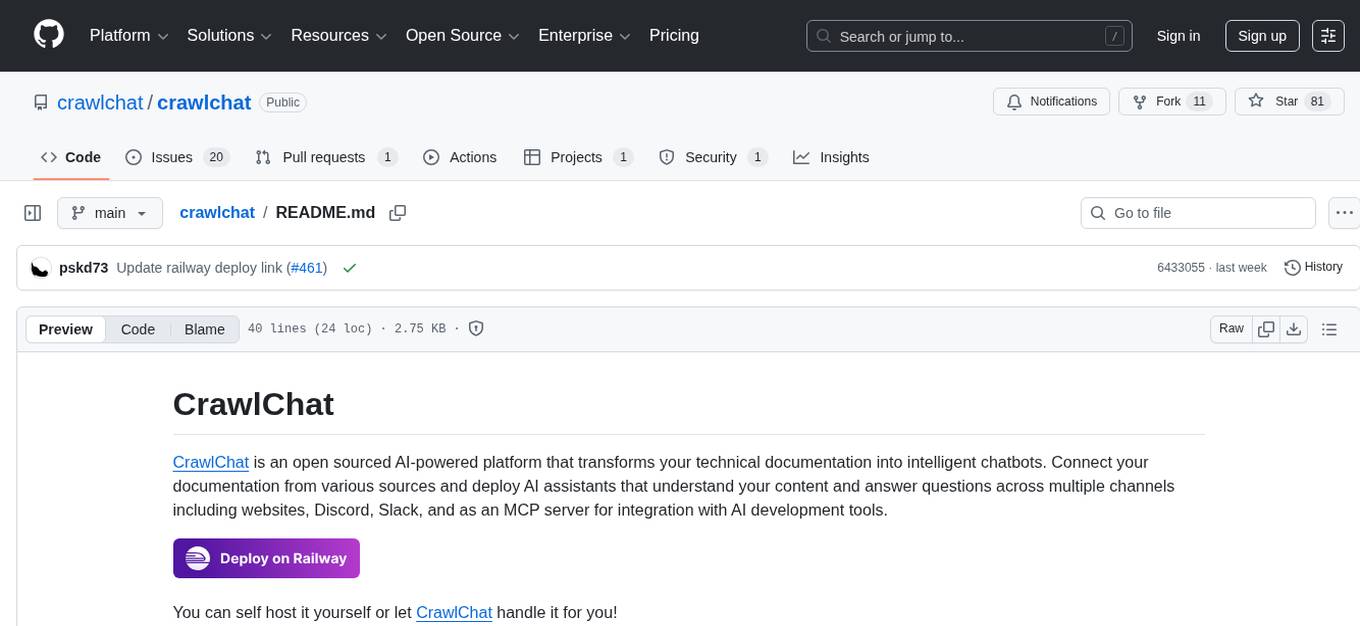
crawlchat
CrawlChat is an open sourced AI-powered platform that transforms technical documentation into intelligent chatbots. It allows users to connect documentation from various sources and deploy AI assistants that can answer questions across multiple channels. The platform includes services like front-facing React app, Express app, Discord bot, Slack app, and more. Users can self-host the platform using Dockerfiles and set up environment variables for easy deployment. Local development is quick and easy, allowing users to contribute by starting the necessary services and making improvements or adding features.
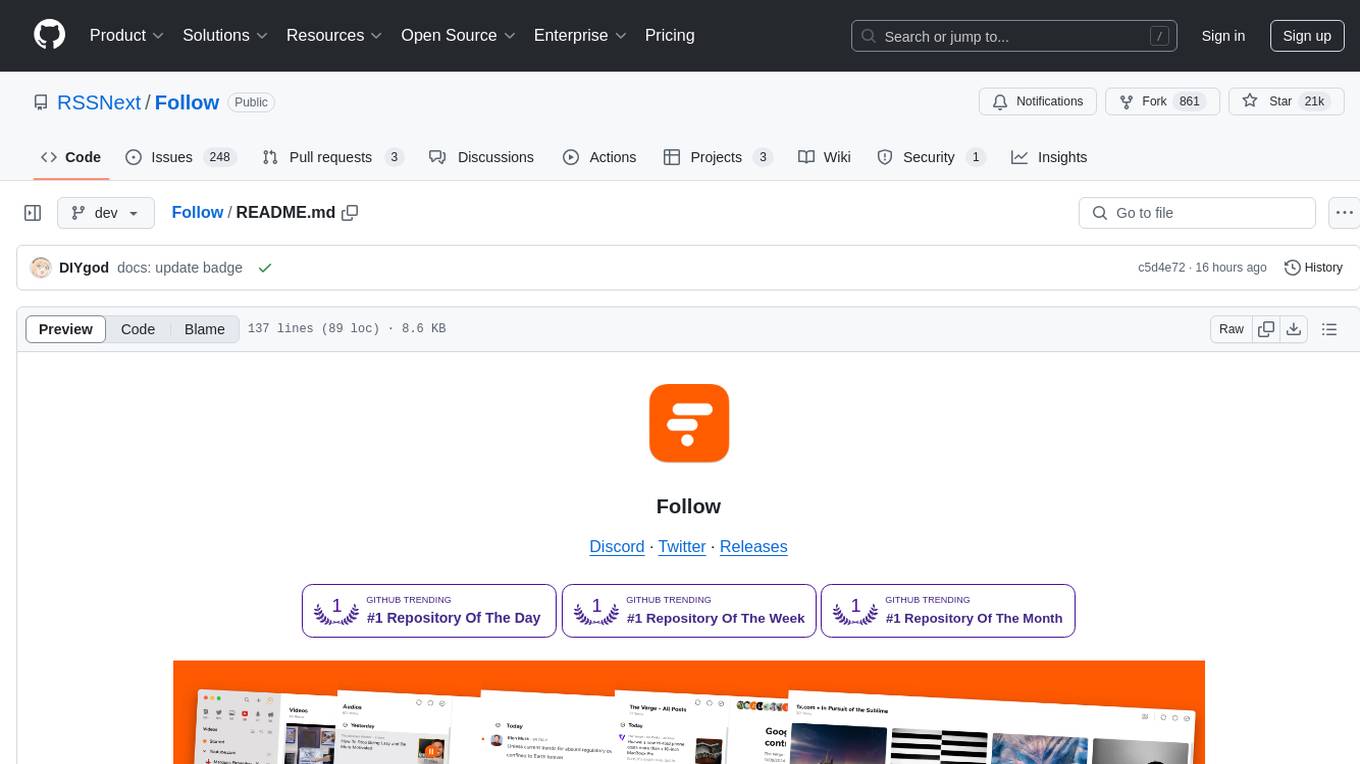
Follow
Follow is a content organization tool that creates a noise-free timeline for users, allowing them to share lists, explore collections, and browse distraction-free. It offers features like subscribing to feeds, AI-powered browsing, dynamic content support, an ownership economy with $POWER tipping, and a community-driven experience. Follow is under active development and welcomes feedback from users and developers. It can be accessed via web app or desktop client and offers installation methods for different operating systems. The tool aims to provide a customized information hub, AI-powered browsing experience, and support for various types of content, while fostering a community-driven and open-source environment.
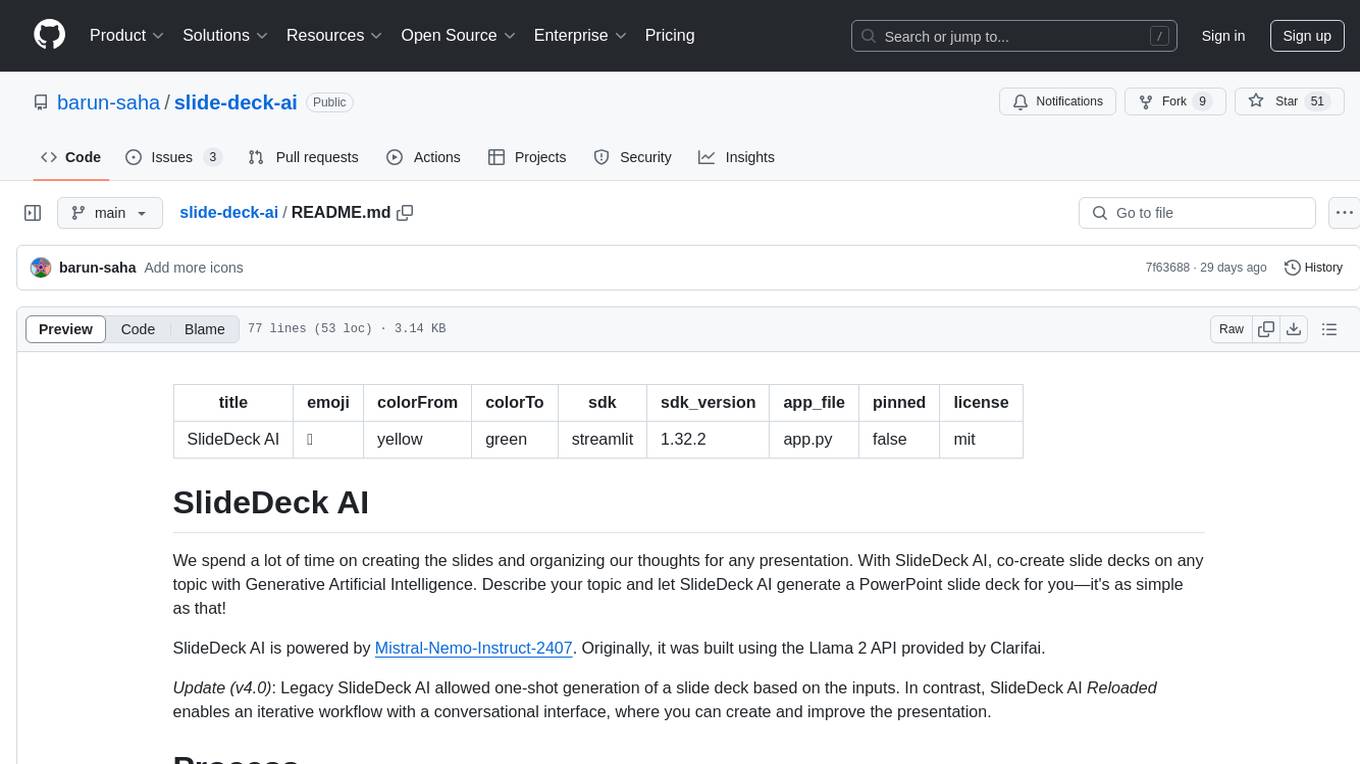
slide-deck-ai
SlideDeck AI is a tool that leverages Generative Artificial Intelligence to co-create slide decks on any topic. Users can describe their topic and let SlideDeck AI generate a PowerPoint slide deck, streamlining the presentation creation process. The tool offers an iterative workflow with a conversational interface for creating and improving presentations. It uses Mistral Nemo Instruct to generate initial slide content, searches and downloads images based on keywords, and allows users to refine content through additional instructions. SlideDeck AI provides pre-defined presentation templates and a history of instructions for users to enhance their presentations.
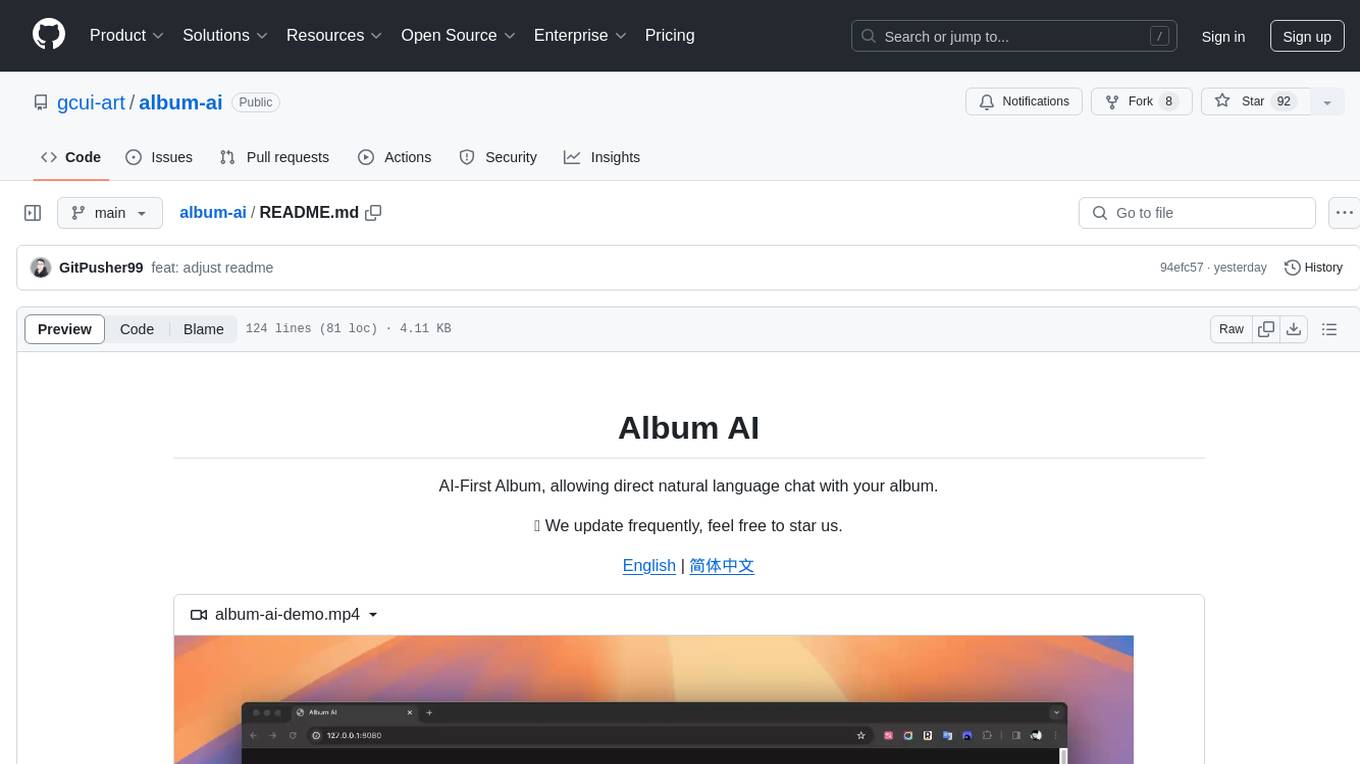
album-ai
Album AI is an experimental project that uses GPT-4o-mini to automatically identify metadata from image files in the album. It leverages RAG technology to enable conversations with the album, serving as a photo album or image knowledge base to assist in content generation. The tool provides APIs for search and chat functionalities, supports one-click deployment to platforms like Render, and allows for integration and modification under a permissive open-source license.
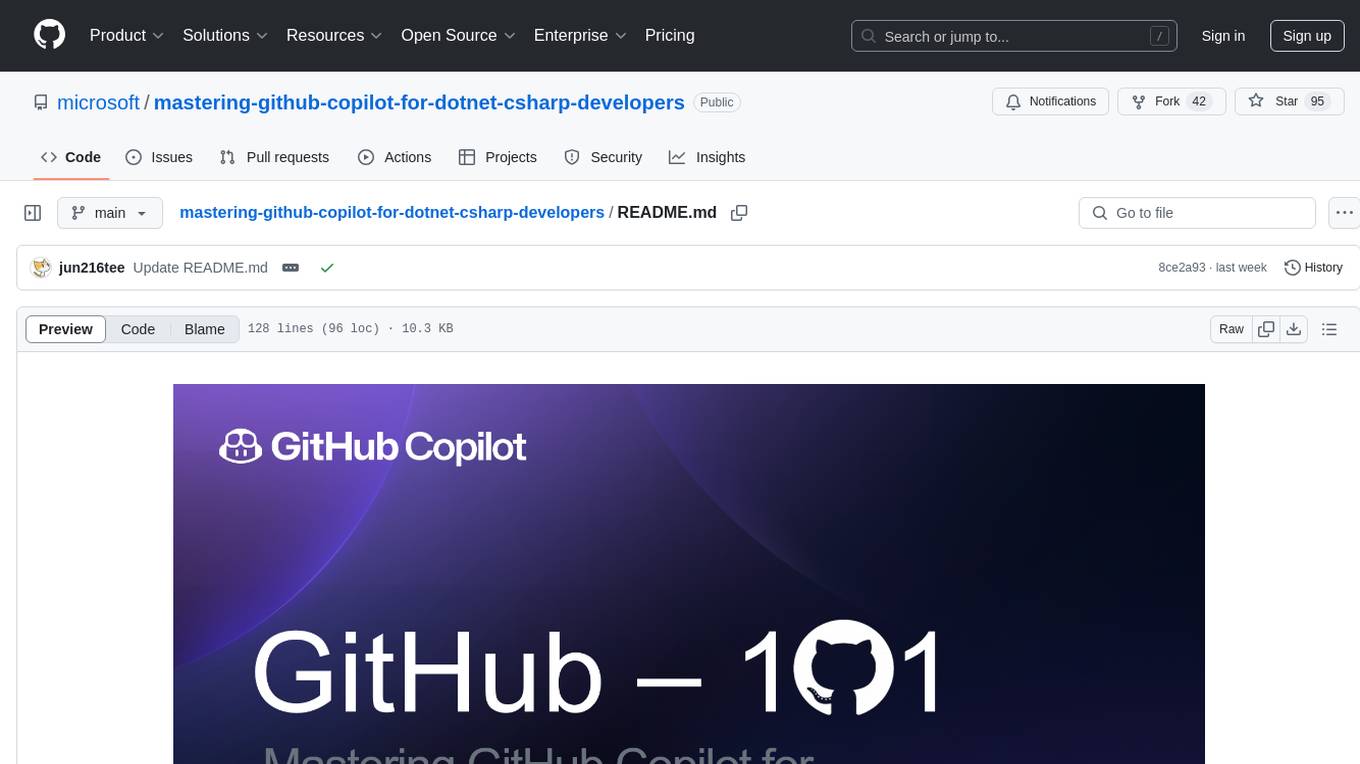
mastering-github-copilot-for-dotnet-csharp-developers
Enhance coding efficiency with expert-led GitHub Copilot course for C#/.NET developers. Learn to integrate AI-powered coding assistance, automate testing, and boost collaboration using Visual Studio Code and Copilot Chat. From autocompletion to unit testing, cover essential techniques for cleaner, faster, smarter code.
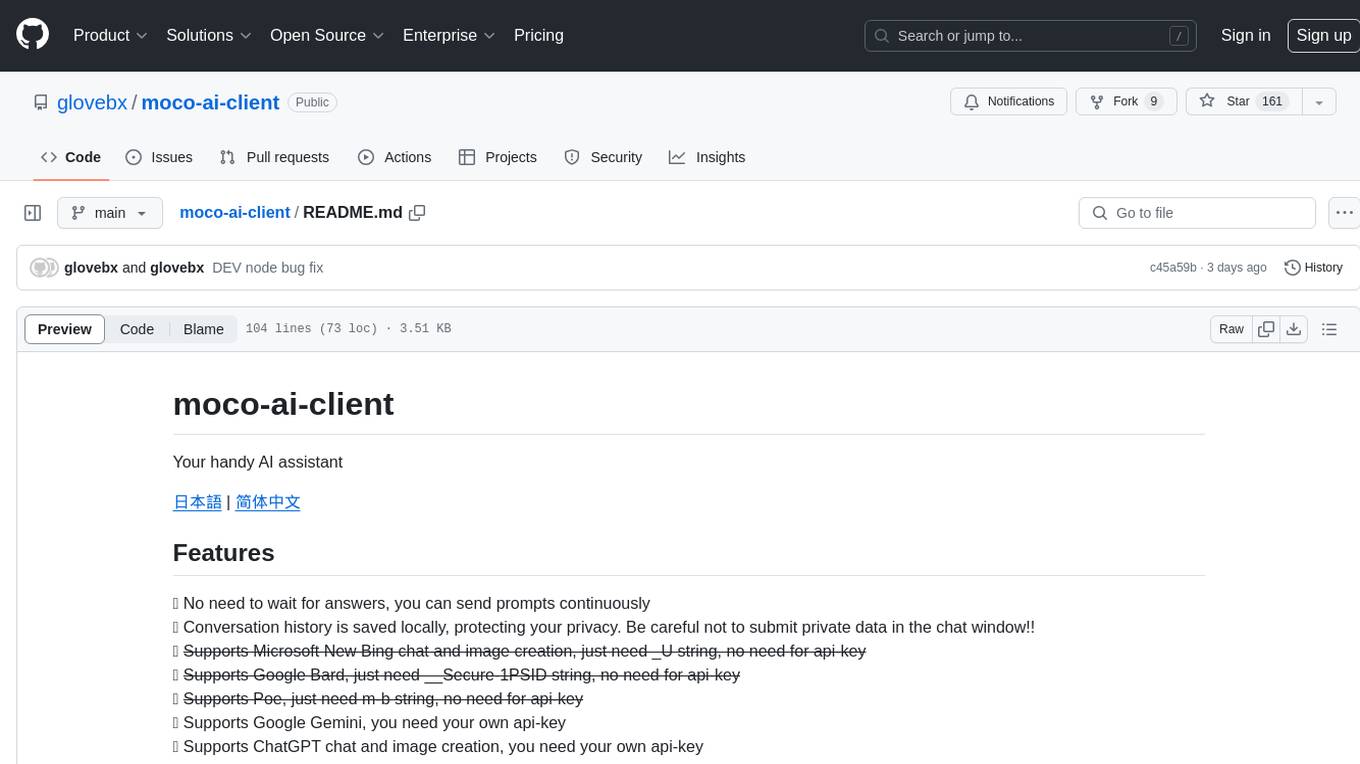
moco-ai-client
The moco-ai-client is an AI assistant tool that allows users to send prompts continuously without waiting for answers. It saves conversation history locally to protect privacy. The tool supports various AI services like Google Gemini, ChatGPT, and GPT3.5. It also enables voice input in Chinese and English, text-to-speech in multiple languages, and image generation. Users can customize roles and share content easily. The tool is under development, and suggestions are welcome for improvements.
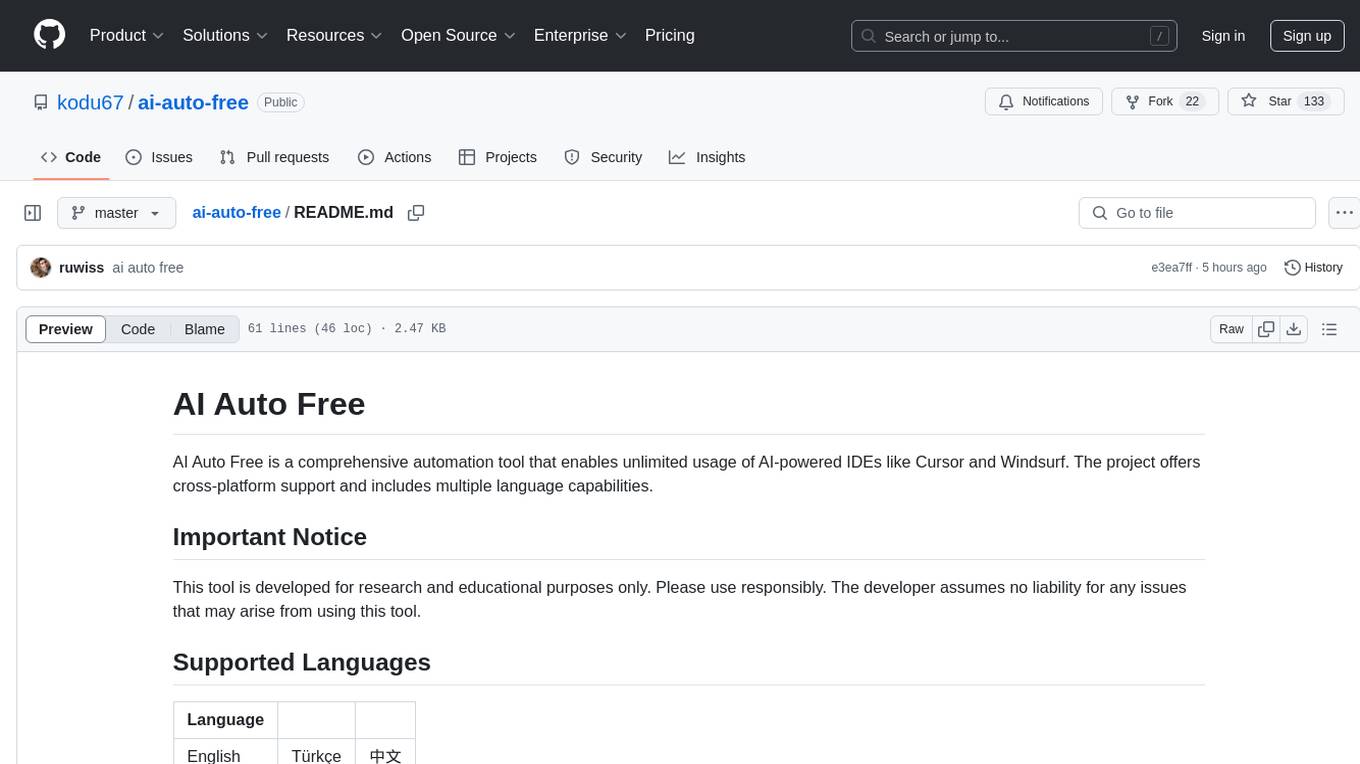
ai-auto-free
AI Auto Free is a comprehensive automation tool that enables unlimited usage of AI-powered IDEs like Cursor and Windsurf. It offers cross-platform support and multiple language capabilities. The tool automates tasks such as account creation and email verification, overcoming trial limits and unauthorized requests. Users can use it for educational and research purposes to enhance their coding experience with AI.
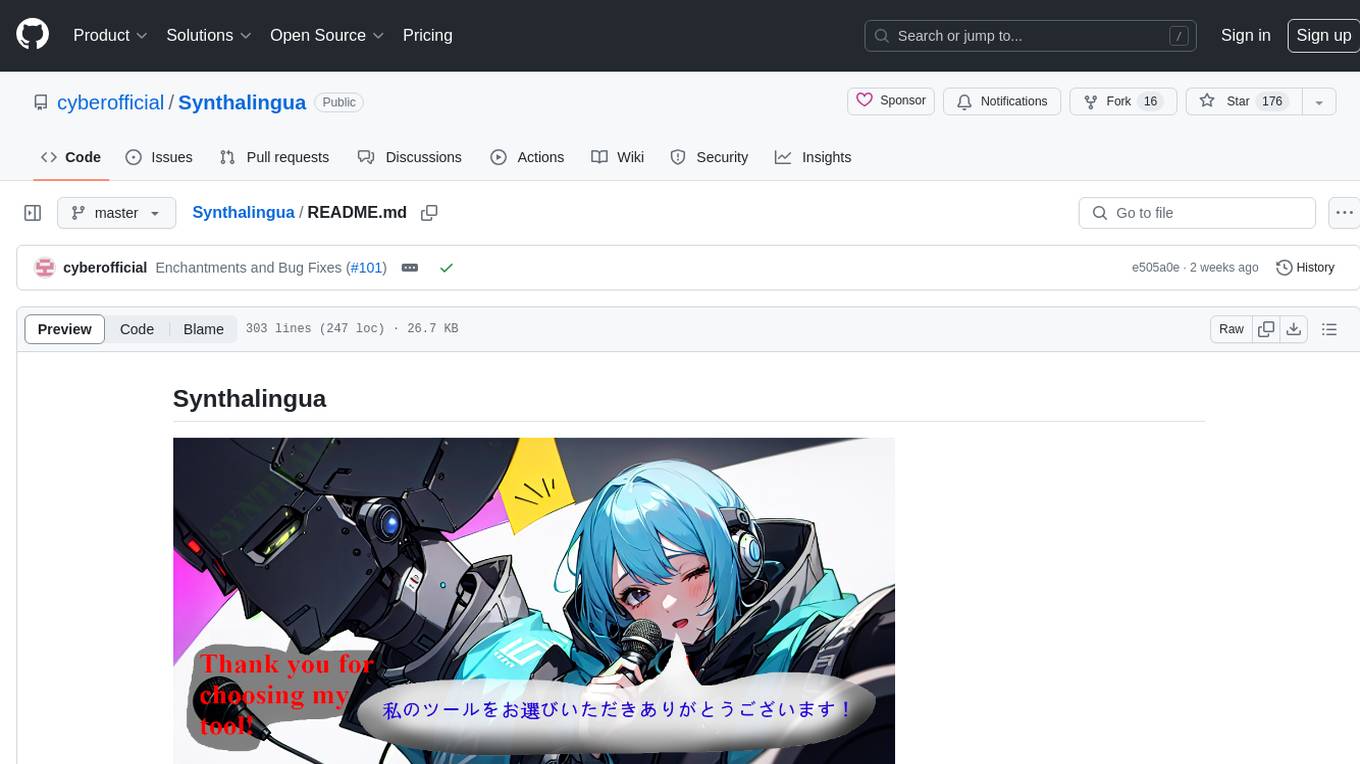
Synthalingua
Synthalingua is an advanced, self-hosted tool that leverages artificial intelligence to translate audio from various languages into English in near real time. It offers multilingual outputs and utilizes GPU and CPU resources for optimized performance. Although currently in beta, it is actively developed with regular updates to enhance capabilities. The tool is not intended for professional use but for fun, language learning, and enjoying content at a reasonable pace. Users must ensure speakers speak clearly for accurate translations. It is not a replacement for human translators and users assume their own risk and liability when using the tool.
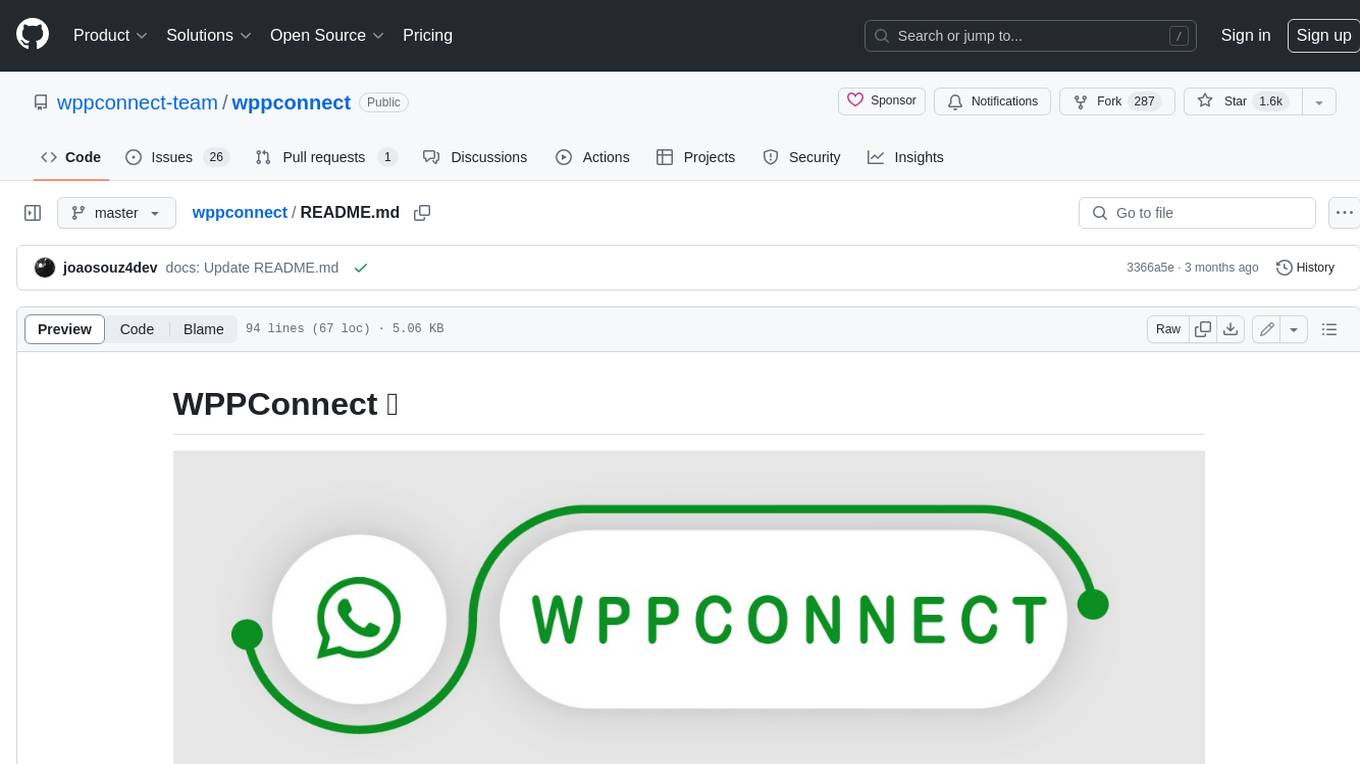
wppconnect
WPPConnect is an open source project developed by the JavaScript community with the aim of exporting functions from WhatsApp Web to the node, which can be used to support the creation of any interaction, such as customer service, media sending, intelligence recognition based on phrases artificial and many other things.
For similar tasks

LLMStack
LLMStack is a no-code platform for building generative AI agents, workflows, and chatbots. It allows users to connect their own data, internal tools, and GPT-powered models without any coding experience. LLMStack can be deployed to the cloud or on-premise and can be accessed via HTTP API or triggered from Slack or Discord.

ai-guide
This guide is dedicated to Large Language Models (LLMs) that you can run on your home computer. It assumes your PC is a lower-end, non-gaming setup.

onnxruntime-genai
ONNX Runtime Generative AI is a library that provides the generative AI loop for ONNX models, including inference with ONNX Runtime, logits processing, search and sampling, and KV cache management. Users can call a high level `generate()` method, or run each iteration of the model in a loop. It supports greedy/beam search and TopP, TopK sampling to generate token sequences, has built in logits processing like repetition penalties, and allows for easy custom scoring.

jupyter-ai
Jupyter AI connects generative AI with Jupyter notebooks. It provides a user-friendly and powerful way to explore generative AI models in notebooks and improve your productivity in JupyterLab and the Jupyter Notebook. Specifically, Jupyter AI offers: * An `%%ai` magic that turns the Jupyter notebook into a reproducible generative AI playground. This works anywhere the IPython kernel runs (JupyterLab, Jupyter Notebook, Google Colab, Kaggle, VSCode, etc.). * A native chat UI in JupyterLab that enables you to work with generative AI as a conversational assistant. * Support for a wide range of generative model providers, including AI21, Anthropic, AWS, Cohere, Gemini, Hugging Face, NVIDIA, and OpenAI. * Local model support through GPT4All, enabling use of generative AI models on consumer grade machines with ease and privacy.

khoj
Khoj is an open-source, personal AI assistant that extends your capabilities by creating always-available AI agents. You can share your notes and documents to extend your digital brain, and your AI agents have access to the internet, allowing you to incorporate real-time information. Khoj is accessible on Desktop, Emacs, Obsidian, Web, and Whatsapp, and you can share PDF, markdown, org-mode, notion files, and GitHub repositories. You'll get fast, accurate semantic search on top of your docs, and your agents can create deeply personal images and understand your speech. Khoj is self-hostable and always will be.

langchain_dart
LangChain.dart is a Dart port of the popular LangChain Python framework created by Harrison Chase. LangChain provides a set of ready-to-use components for working with language models and a standard interface for chaining them together to formulate more advanced use cases (e.g. chatbots, Q&A with RAG, agents, summarization, extraction, etc.). The components can be grouped into a few core modules: * **Model I/O:** LangChain offers a unified API for interacting with various LLM providers (e.g. OpenAI, Google, Mistral, Ollama, etc.), allowing developers to switch between them with ease. Additionally, it provides tools for managing model inputs (prompt templates and example selectors) and parsing the resulting model outputs (output parsers). * **Retrieval:** assists in loading user data (via document loaders), transforming it (with text splitters), extracting its meaning (using embedding models), storing (in vector stores) and retrieving it (through retrievers) so that it can be used to ground the model's responses (i.e. Retrieval-Augmented Generation or RAG). * **Agents:** "bots" that leverage LLMs to make informed decisions about which available tools (such as web search, calculators, database lookup, etc.) to use to accomplish the designated task. The different components can be composed together using the LangChain Expression Language (LCEL).

danswer
Danswer is an open-source Gen-AI Chat and Unified Search tool that connects to your company's docs, apps, and people. It provides a Chat interface and plugs into any LLM of your choice. Danswer can be deployed anywhere and for any scale - on a laptop, on-premise, or to cloud. Since you own the deployment, your user data and chats are fully in your own control. Danswer is MIT licensed and designed to be modular and easily extensible. The system also comes fully ready for production usage with user authentication, role management (admin/basic users), chat persistence, and a UI for configuring Personas (AI Assistants) and their Prompts. Danswer also serves as a Unified Search across all common workplace tools such as Slack, Google Drive, Confluence, etc. By combining LLMs and team specific knowledge, Danswer becomes a subject matter expert for the team. Imagine ChatGPT if it had access to your team's unique knowledge! It enables questions such as "A customer wants feature X, is this already supported?" or "Where's the pull request for feature Y?"

infinity
Infinity is an AI-native database designed for LLM applications, providing incredibly fast full-text and vector search capabilities. It supports a wide range of data types, including vectors, full-text, and structured data, and offers a fused search feature that combines multiple embeddings and full text. Infinity is easy to use, with an intuitive Python API and a single-binary architecture that simplifies deployment. It achieves high performance, with 0.1 milliseconds query latency on million-scale vector datasets and up to 15K QPS.
For similar jobs

sweep
Sweep is an AI junior developer that turns bugs and feature requests into code changes. It automatically handles developer experience improvements like adding type hints and improving test coverage.

teams-ai
The Teams AI Library is a software development kit (SDK) that helps developers create bots that can interact with Teams and Microsoft 365 applications. It is built on top of the Bot Framework SDK and simplifies the process of developing bots that interact with Teams' artificial intelligence capabilities. The SDK is available for JavaScript/TypeScript, .NET, and Python.

ai-guide
This guide is dedicated to Large Language Models (LLMs) that you can run on your home computer. It assumes your PC is a lower-end, non-gaming setup.

classifai
Supercharge WordPress Content Workflows and Engagement with Artificial Intelligence. Tap into leading cloud-based services like OpenAI, Microsoft Azure AI, Google Gemini and IBM Watson to augment your WordPress-powered websites. Publish content faster while improving SEO performance and increasing audience engagement. ClassifAI integrates Artificial Intelligence and Machine Learning technologies to lighten your workload and eliminate tedious tasks, giving you more time to create original content that matters.

chatbot-ui
Chatbot UI is an open-source AI chat app that allows users to create and deploy their own AI chatbots. It is easy to use and can be customized to fit any need. Chatbot UI is perfect for businesses, developers, and anyone who wants to create a chatbot.

BricksLLM
BricksLLM is a cloud native AI gateway written in Go. Currently, it provides native support for OpenAI, Anthropic, Azure OpenAI and vLLM. BricksLLM aims to provide enterprise level infrastructure that can power any LLM production use cases. Here are some use cases for BricksLLM: * Set LLM usage limits for users on different pricing tiers * Track LLM usage on a per user and per organization basis * Block or redact requests containing PIIs * Improve LLM reliability with failovers, retries and caching * Distribute API keys with rate limits and cost limits for internal development/production use cases * Distribute API keys with rate limits and cost limits for students

uAgents
uAgents is a Python library developed by Fetch.ai that allows for the creation of autonomous AI agents. These agents can perform various tasks on a schedule or take action on various events. uAgents are easy to create and manage, and they are connected to a fast-growing network of other uAgents. They are also secure, with cryptographically secured messages and wallets.

griptape
Griptape is a modular Python framework for building AI-powered applications that securely connect to your enterprise data and APIs. It offers developers the ability to maintain control and flexibility at every step. Griptape's core components include Structures (Agents, Pipelines, and Workflows), Tasks, Tools, Memory (Conversation Memory, Task Memory, and Meta Memory), Drivers (Prompt and Embedding Drivers, Vector Store Drivers, Image Generation Drivers, Image Query Drivers, SQL Drivers, Web Scraper Drivers, and Conversation Memory Drivers), Engines (Query Engines, Extraction Engines, Summary Engines, Image Generation Engines, and Image Query Engines), and additional components (Rulesets, Loaders, Artifacts, Chunkers, and Tokenizers). Griptape enables developers to create AI-powered applications with ease and efficiency.
